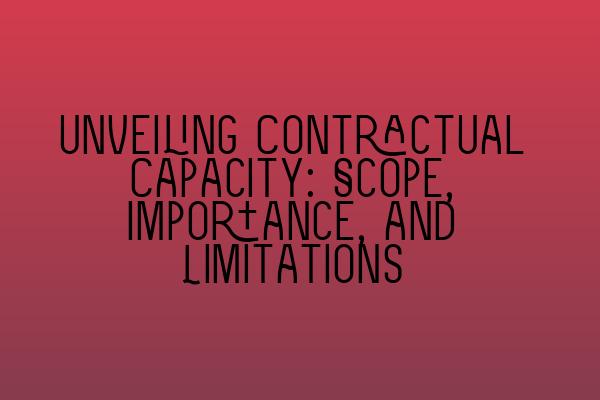Unveiling Contractual Capacity: Scope, Importance, and Limitations
Contractual capacity is a vital aspect of contract law that determines the ability of parties to enter into a legally binding agreement. It refers to the mental and legal competence of individuals to understand and undertake the rights and obligations outlined in a contract. In this blog post, we will delve into the scope, importance, and limitations of contractual capacity, shedding light on its significance in the world of legal contracts.
Scope of Contractual Capacity:
Contractual capacity encompasses the mental and legal competence of individuals entering into a contract. It relates to their understanding of the terms, consequences, and implications of a contract. While everyone possesses contractual capacity by default, there are certain exceptions and limitations that must be considered.
The legal framework surrounding contractual capacity revolves around three main categories of individuals: minors, individuals with mental incapacities, and individuals under the influence of drugs or alcohol. Each of these categories presents unique challenges and considerations concerning their ability to understand and consent to contractual obligations.
Importance of Contractual Capacity:
The importance of contractual capacity cannot be overstated, as it forms the foundation for the validity and enforceability of contracts. Without the capacity to comprehend the terms and implications of an agreement, individuals may unknowingly enter into unfavorable contracts or be taken advantage of by unscrupulous parties. By ensuring the parties involved have the capacity to fully understand and consent to the terms, the law aims to protect vulnerable individuals and maintain the integrity of contractual relationships.
For instance, when dealing with minors, the law acknowledges their limited capacity to fully comprehend the consequences of their actions. As a result, contracts entered into by minors are generally considered voidable, which means that the minor has the option to either enforce the contract or disaffirm it at their discretion. This protects young individuals from making impulsive or uninformed decisions that could have long-term implications.
Limitations of Contractual Capacity:
While contractual capacity is a fundamental principle, it does have its limitations. For instance, individuals with severe mental incapacities, such as those suffering from certain psychological disorders or intellectual disabilities, may lack the capacity to fully comprehend the terms of a contract. In such cases, the law seeks to safeguard the interests and well-being of these individuals by rendering the contract voidable.
It is important to note that contractual capacity is distinct from the concept of fairness or reasonableness in a contract. Even if a party possesses full contractual capacity, they may still enter into a contract that is considered unfair or unreasonable under the law. These situations call into question other aspects of the contract, such as duress, undue influence, or unconscionability.
Conclusion:
Understanding the scope, importance, and limitations of contractual capacity is crucial for both solicitors and individuals involved in contract negotiations. By ensuring that all parties possess the necessary capacity to fully comprehend and consent to the terms of an agreement, we can build a legal framework that protects the rights and interests of everyone involved.
If you’re preparing for the SQE exams, we invite you to check out our related articles on SQE 1 Practice Exam Questions, SQE 1 Practice Mocks FLK1 FLK2, SQE 2 Preparation Courses, SQE 1 Preparation Courses, and SRA SQE Exam Dates. These resources can provide you with valuable insights and practice materials to enhance your understanding of contract law and related topics.
Remember, contractual capacity is not a mere technicality; it is the cornerstone of a fair and equitable contractual system. Make sure to tread carefully and seek professional advice when dealing with complex legal matters to ensure your contracts are valid and enforceable.
